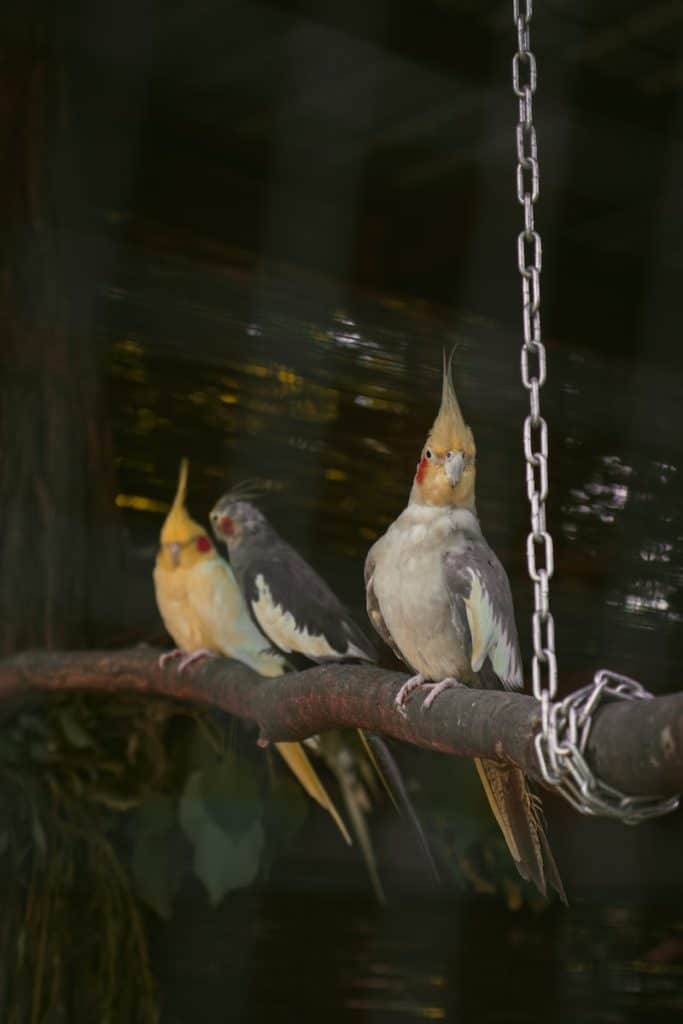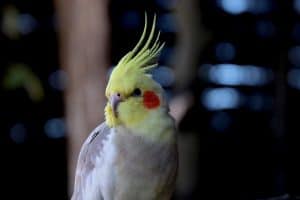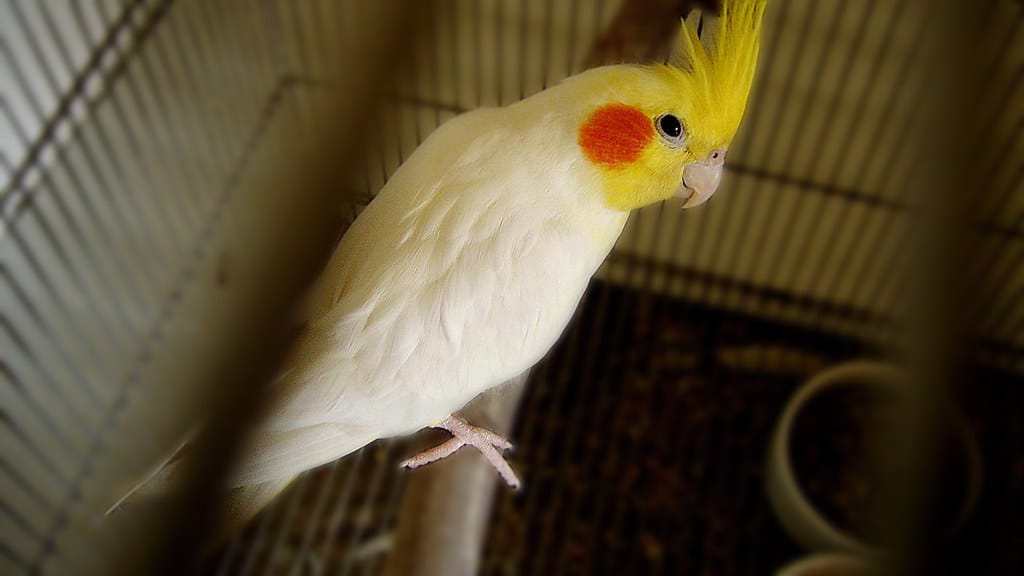At what age do cockatiels stop breeding? Cockatiels can continue to breed until they are around 10 years old. However, the average age at which cockatiels stop breeding is between 5 and 7 years old. Cockatiels typically have a lifespan of 15 to 20 years, so even if they do stop breeding at an early age.
Cockatiels are one of the most popular pet birds, and many people buy a pair with the intention of raising cockatiel children. There is always a high demand for these amusing and cuddly cockatiels because they are such popular pets.
If you’re thinking about breeding cockatiels or breeding birds, be aware that it’s not as easy as it might seem. More than a few new owners have been surprised when their supposedly male bird suddenly drops cockatiel eggs – or their supposedly senior female cockatiel deposits one! Are you wondering what age do cockatiels stop laying eggs? Read on for more information.

What Age Do Cockatiels Stop Breeding?
Cockatiels can lay eggs for up to 10 years after reaching sexual maturity. However, it is not unusual for a female cockatiel to produce eggs in her early twenties! However, late-life egg laying might be detrimental to your cockatiel’s health. Chronic egg laying may also be harmful to your bird.
When Is a Female Cockatiel Ready to Lay Eggs

Cockatiels reach sexual maturity anywhere from nine to 12 months of age, on average. Male cockatiels are more likely to be ready to breed than female cockatiels. Let’s say you have a male and a female cockatiel who were born at the same time. As early as six to 10 months old, your male cockatiel may start showing signs of breeding activity and readiness.
The age at which a cockatiel reaches maturity and is prepared varies, depending on the breeding pair. Cockatiels that are not purebred may take longer to mature, sometimes up to one year. In contrast, female cockatiels might not become ripe and ready until they are 12 months old. Cockatiel breeders caution against breeding young cockatiels before the age of 12 months for males and 18 months for females since it is very nutritionally demanding. The main reason why is because delaying reproduction past 18 months increases the nutritional value of your breeding colony’s eggs. You can generally anticipate healthier cockatiel chicks if you can wait 18 months to breed your pair.
Preparing Cockatiels for Breeding
You will need a male bird and a female bird.
Sexing Cockatiels
There are three main factors to consider when attempting to sex a cockatiel of the most commonly-kept colour form:
Tail Barring –Adult females and males of both sexes have yellow stripes on the belly underside, although these are uncommon in adult males. The floor is glossy black, with a rich texture that absorbs dirt and moisture while maintaining a healthy shine. This roomy can fit up to eight persons thanks to its ample size (120-long).
Facial Colour – The head of most adult male cardinals is a bright, noticeable yellow. For females and juveniles, the coloration is more subdued and often only comprises a few pale yellow feathers on an otherwise grey background.
Facial Spots – The distinctive orange spot on the cheek of a cockatiel is one of its features. This is generally much paler in juvenile and adult females than it is in adult male. However, many immature birds meet the definition of an adult female, so you’ll want to double-check your birds’ ages first. Adult males are therefore fairly simple to identify. In other words, it’s quite easy to tell whether or not an individual is a boy or girl at birth.
- STURDY CONSTRUCTION - Made of the highest-quality iron frame with a black powder varnish guaranteed to make this birdcage sturdy and durable, even against playful birds; With 4 caster wheels at the bottom, so you can move it anywhere you like, saving you effort
- MULTIPLE DOORWAYS - Designed with 2 doorways for your pet birds to enter and exit; The top of the cage opens up and can be propped open with a wooden crossbeam for your birds to stand on; Traditional doors are located on the side of the cage
- SLIDE-OUT TRAY - Equipped with a plastic tray at the bottom of this bird cage that can be removed for easy cleaning, so as to keep a clean and tidy environment as well as keep your pets safe
- VARIOUS WAYS TO PLAY - Includes a swing and multiple bars to stand on; Convenient doors so you can change the food without disturbing your pets; Locking joints to keep the cage secure; With little design features that stand out among the crowd
- EXTRA STORAGE SPACE - Comes with an additional mesh shelf so you can store food and toys out of the way; Provided with a wealth of accessories, including 4 Wooded perches, 4 Feeding cups, and 1 swing
Cockatiel Breeding Age
There are several reasons why it is critical to select correctly-aged birds. If cockatiels reproduce at 4-6 months old, they won’t be as healthy in the long run. Additionally, older birds tend to make healthier parents and leads to better long-term results.
Finally, it’s important to remember that egg-binding is much more common in very young or old birds, and often deadly. Most experts say that you shouldn’t breed cockatiels until they’re 18 to 24 months old, and after 8 to 10 years their fertility starts decreasing sharply.
What Age Do Cockatiels Stop Breeding- Bottom Line
While cockatiels can lay eggs for up to 10 years after reaching sexual maturity, it is not unusual for a female cockatiel to produce eggs in her early twenties! However, late-life egg laying might be detrimental to your cockatiel’s health. Chronic egg laying may also be harmful to your bird.
Cockatiels typically live 15 to 20 years in captivity, although some have been known to live much longer. So, if you’re thinking about breeding cockatiels, be sure to do your research and select healthy birds that are of the appropriate age.
And, as always, consult with an avian veterinarian before making any decisions about breeding your cockatiel.
For those looking to deepen their bond with their cockatiel, don’t miss out on these insightful articles. Learn the best techniques for getting your cockatiel to sit on your finger and understand the steps to tame a cockatiel that bites, ensuring a harmonious relationship with your feathered friend. Curious about their unique features? Discover why cockatiels have crests and what these crests indicate about their mood and health. Additionally, it’s important to be aware of potential health concerns, such as whether cockatiel dust is harmful to both birds and their owners. These articles provide valuable knowledge to enhance your experience as a cockatiel owner.
How to Distinguish a Male Cockatiel From a Female Cockatiel
- What Types Of Cockatiel Mutations Are There
- What Tricks Can You Teach Your Cockatiel
- What Toys Do Cockatiels Like
- What To Put In The Cage Tray Of Your Cockatiel
- What To Do When Your Cockatiels Molting
- What To Do When Your Cockatiel Escapes
- What To Do When You First Bring Your Cockatiel Home
- What To Do If Your Cockatiel Bites You
- What To Do If You Need To Take Your Cockatiel On A Vacation
- What Smells Are Toxic To Birds
- What Plants Are Toxic To Cockatiels
- What Other Accessories Do You Need To Buy For Your Cockatiel
- What Is Your Cockatiels Senses
- What Is The Pelleted Diet
- What Is The Lifespan Of A Pet Cockatiel
- What Is The Cockatiels Background
- What Is The Avian Anatomy Of Your Cockatiel
- What Is My Cockatiel Trying To Tell Me
- What Is A Pied Cockatiel
- What Is A Cockatiel
- What Foods Your Cockatiel Should Avoid
- What Foods Are Toxic To Cockatiels
- What Does It Mean When A Cockatiel Puffs Up
- What Does A Pregnant Cockatiel Look Like
- What Do You Need To Know About Your Cockatiels Feathers
- What Do You Need To Know About Your Cockatiels Droppings
- What Do Cockatiels Eat In The Wild
- What Do Cockatiels Eat Diet Nutrition
- What Are Your Cockatiels Seasonal Needs
- What Are Your Cockatiels Possible Health Problems
- What Are Your Cockatiels Household Hazards
- What Are The Nutrition Requirements Of Your Cockatiels Food
- What Are The First Aids In Case Of Emergency To Your Cockatiel
- What Are The Cockatiel Basics
- What Are Some Tips On Training Your Cockatiel
- What Are Common Cockatiel Behaviors
- What Are Cockatiels Signs Of Illness
- What Age Do Cockatiels Stop Breeding




